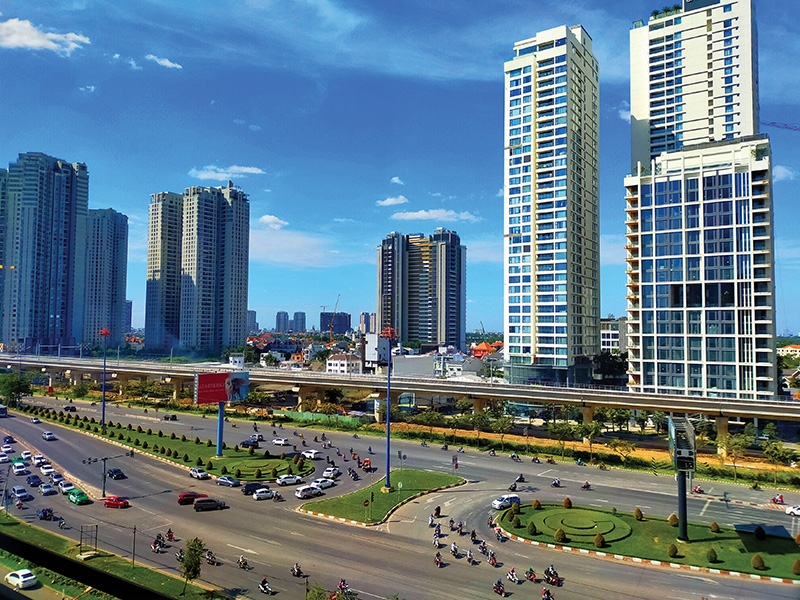Developers call for more practical support policies
 |
| Real estate developers have been suggesting concessions on taxes and fees to clear the hurdles of the pandemic, Photo: Le Toan |
According to Nguyen Quang Tin, financial director of Development Investment Construction JSC, as the real estate market is currently devastated by the epidemic, the government should issue strong financial supporting policies to help real estate investors and developers to overcome this difficult time.
The government has issued a package of VND250 trillion ($10.87 billion) to support enterprises via the banking system, however, the business community is still waiting for detailed guidelines.
“Singapore’s government has issued financial support policies to enterprises, such as refunding a part of the income tax or giving tax relief and helping enterprises approach bank loans. Similar support measures would be very useful for us,” Tin said.
He added that policies to support enterprises must be synchronised for both enterprises and banks, since banks that are giving loans to developers should also be supported.
Meanwhile, Ngo Quang Phuc, general director of Phu Dong Group, said that to date, many developers have been running short on finances as they have been relying on revenue gained from previous years.
“The epidemic was an unexpected blow – it came as a shock to the market and froze our business,” Phuc said. “We suggest some financial incentives such as tax relief for developers, especially those in the hospitality sector, which has suffered the largest impact from the outbreak. They would react well to a 50 per cent reduction in VAT, corporate income tax, and import tax, while it would also go a long way if they reduced personal income tax for tourism workers based on the damage from the disease.”
“If the pandemic cannot be contained in the next few months, many developers will go bankrupt,” Phuc explained.
Kevin Hawkins, co-executive partner of ZICO Law Vietnam, told VIR that Vietnamese leaders should consider instructing the State Bank of Vietnam to adjust interest rates applied to real estate projects in the resort and retail segments as well as other segments which have also been adversely affected, to help lower investor losses.
“Moreover, the government should also encourage developers to restructure the payment schedules for residential projects to allow buyers more time to make payments, and delay land lease payments to help projects which have leased land arrangements,” Hawkins added.
The Ho Chi Minh City Real Estate Association (HoREA) suggested the government to forego five months of VAT and social insurance, and defer payments on credit loans.
HoREA chairman Le Hoang Chau said that proposals included halving land lease tax for real estate developers in 2020 and 2021 and extending the tax payment deadline until the second half of this year.
According to Nguyen Trong Ninh, head of the Housing and Real Estate Market Management Department under the Ministry of Construction (MoC), the ministry is building a special package for the real estate sector in tandem with the new government directive.
Even though figures in the package are not yet fixed, Ninh said the MoC is asking the government to pump more capital into the social and affordable housing segments.
“The MoC will propose the State Bank of Vietnam to compensate the difference in interest rates for social housing loans granted by commercial and social banks. This will help reduce interest rates provided to homebuyers,” said Ninh.
Former Deputy Minister of Natural Resources and Environment Dang Hung Vo, meanwhile, suggested competent bodies to support the dozens of thousands of realtors who were dismissed due to the downturn of the real estate market.
The Vietnam National Real Estate Association reported that around 500 transaction centres were closed in the first two months of this year.
Meanwhile, some local banks earlier this month adjusted interest rates for homebuyers with more flexible packages.
Some banks are expanding the loanable margin to up to 90 per cent of the assets’ value, from the previous rate of 70 per cent. Lending terms were also increased to a maximum of 35 years (with certain conditions) from the previous 20 years.
PVcomBank is one of the first lenders offering a financial package of VND10.5 trillion ($456.5 million) with interest rates from 7.49 per cent for manufacturing, consumption, car purchase, and house purchase to support enterprises and individual buyers during the pandemic.
| Dr Su Ngoc Khuong - Senior director of investment Savills Vietnam
Directive 11 targets all sectors in the economy and rolls out many great efforts from the government to support enterprises. This directive is very detailed and comprehensive, with a focus on three issues: reviewing and cutting administrative procedures for enterprises, improving information transparency, and improving the infrastructure system. These outstanding issues have a major impact on the country’s economy. The most important thing in supporting the real estate sector is not the capital. Of course, capital is important for every enterprise, however, legal issues are the most important right now, because developers can only proceed with projects if they hold all requisite legal documentats and approvals. When their projects are ready, there are many different ways to raise capital such as striking up a partnership with another investor, bond issuance, M&A transaction, or leverage with banks. Michael Piro - COO, Indochina Capital
The new directive is a ray of hope for many companies, in this unprecedented global pandemic. For Vietnam’s real estate industry, hospitality, retail, and tourism-related assets are the hardest hit by the outbreak, and the residential segment is suffering due to travel bans which have prevented foreign buyers from flying in to close deals. Retail owners have had to reduce rents for tenants as social distancing leaves malls and shopping centres empty. Developers and owners have been unable to organise sales launches and inaugurate new properties, causing declines in revenue for even the largest real estate players, and forcing many brokerages to temporarily close due to low supply and interest from the market. We would suggest the government to implement financial relief policies such as allowing real estate businesses to postpone land-use fee payments or instructing banks to adapt flexible terms on credit repayments to avoid real estate loans from turning into crippling debts. Wage subsidies are also recommended to encourage staff retention and decrease financial pressure. On the implementation of the financial aid package, we believe it is important to tailor the support to each sector – support for large developers and for retail and hospitality-focused firms should be different in scale and nature. We urge ministries and their departments to issue clear guidance to eligible companies to implement the packages in a timely and transparent manner. Alain Cany - Country chairman Jardine Matheson Vietnam
As a foreign investor here, we hope there will be no discrimination between local and foreign businesses and both can get support from government action and banks. In the real estate sector, the most heavily impacted segment is clearly hospitality, followed by retail with industrial and offices being amongst the least impacted. Direct focus for the time being should be upon the consumer and workers’ side with support coming lately from banks being supported by the State Bank of Vietnam. The duration of this impact is hard to determine as is the emergence from it. For real estate developers, the government should look at speeding up land sales and auctions, to rebuild government revenues, feed the market with development projects, and correct the misalignment of land pricing to return. It is important in the forthcoming era of more quantitative easing that there is not the effect of more cash just going into dormant land and pushing up prices. |
What the stars mean:
★ Poor ★ ★ Promising ★★★ Good ★★★★ Very good ★★★★★ Exceptional
Related Contents
Latest News
More News
- VNPAY and NAPAS deepen cooperation on digital payments (February 11, 2026 | 18:21)
- Vietnam financial markets on the rise amid tailwinds (February 11, 2026 | 11:41)
- New tax incentives to benefit startups and SMEs (February 09, 2026 | 17:27)
- VIFC launches aviation finance hub to tap regional market growth (February 06, 2026 | 13:27)
- Vietnam records solid FDI performance in January (February 05, 2026 | 17:11)
- Manufacturing growth remains solid in early 2026 (February 02, 2026 | 15:28)
- EU and Vietnam elevate relations to a comprehensive strategic partnership (January 29, 2026 | 15:22)
- Vietnam to lead trade growth in ASEAN (January 29, 2026 | 15:08)
- Japanese business outlook in Vietnam turns more optimistic (January 28, 2026 | 09:54)
- Foreign leaders extend congratulations to Party General Secretary To Lam (January 25, 2026 | 10:01)




 Tag:
Tag:




















 Mobile Version
Mobile Version